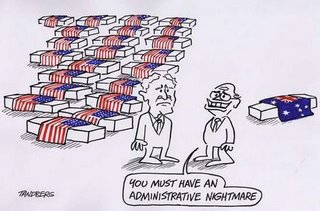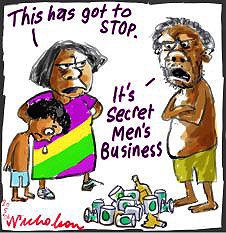Opinion pieces by Phillip Adams and Malcom Fraser


I love this Phillip Adams piece from "The Australian"
Groupie Howard is a crying shameThe PM would do well to distance himself from the US President's diminishing credibility, writes Phillip Adams
May 16, 2006
AS a self-appointed Cassandra, I frequently used this column to make dire predictions about Mark Latham. Electing him leader, I warned the ALP, would amount to involuntary madness and voluntary euthanasia. However, loony Latham was 100 per cent right about one thing: the unseemly intimacy between our Prime Minister and the incumbent US President.
You may recall the outrage when Latham resorted to metaphors involving noses and buttocks. He implied that no cork was ever more tightly fitted in a bottle of champers than John Howard's proboscis in the seat of presidential power. Not merely supportive, Howard's relationship was suppositorial.
But that was back in the heady days of 9/11 when some degree of collective insanity was understandable, even forgivable. That was before George W. Bush had proved himself pig-ignorant of geography, history and intelligent strategy, before he'd embarked on a couple of doomed Vietnam-style adventures. Two wars, one vengeful, one pre-emptive, military cures that would prove worse than the disease, cost the US billions of dollars and thousands of lives, and leave the Bush administration in smouldering ruins. Baghdad on the Potomac.
Where's Latham when you need him? Only he, with his gift for the political vulgarism, could find words to describe the scene this week. There's Howard back in Washington with Bush and his whole discredited team: Dick Cheney, Donald Rumsfeld, Condoleezza Rice, the gang that can't shoot or think straight. The blundering bullies who, deciding to impose Pax Americana with all their might and missile, squandered the world's goodwill, made enemies out of allies.
Not content with telling the biggest porkies in modern history, this bunch of dills were conned by the neo-cons into a huge political, diplomatic and fiscal catastrophe. Now their collective credibility rates with shares in Enron. Yet instead of taking stock, Howard is buying stock.
These days the Bush push is not simply scorned by lefties and liberals but by the very conservatives who once saw the administration as divinely inspired. Like monkeys leaving Gibraltar or rats deserting a sinking ship, senior Republicans and conservative think-tankers are off and running.
When Bush loses Francis Fukuyama or William F. Buckley Jr, you know the game is up. How sensible of Paul Wolfowitz to find political asylum at the World Bank.
At this time a temperate Australian PM would be keeping his distance or extending an olive branch to the Democrats, or at least the moderates in the Republican Party. Whereas ours is behaving like a Beatles groupie, with George, Richard, Donald and Condoleezza replacing John, Paul, George and Ringo. But why now, when the band has lots of misses and has well and truly run out of hits? It doesn't make tactical or strategic sense.
Had Tony Blair kept out of the Iraq fiasco, he'd be unassailable in British politics. Now the policeman outside his door has stronger tenure on No.10 Downing St.
True, Australian voters and media have been amnesic about Howard and the war we had to have, but to promote a mutual admiration society with the Bush people in May 2006 is just plain dumb and embarrassing.
Although complaints about Howard and Bush might be expected from left-wing ratbags like your columnist, let me point out there are some Australian conservatives who agree. For example, there's a scorching critique of Howard's involvement in Iraq and the war on terror in the new issue of Fukuyama's influential The American Interest magazine. Co-authored by veteran foreign policy specialist
Owen Harries and The Australian's opinion page editor Tom Switzer, it reminds us that just hours after the jets hit the twin towers our PM promised "all the support that might be requested of us by the US in relation to any action that might be taken". They emphasise the all and the any, blank-cheque words that have got us into deeper doo-doo than Harold Holt's "all the way with LBJ", and detail the appalling consequences all the way to David Hicks in Guantanamo.
Now is the time to extricate ourselves from another quagmire created by the US. To follow Bush blindly into Baghdad and to remain in step with subsequent US policy was a monumental and shameful mistake. To continue to prance around in Washington with these buffoons is another. It suggests that Howard has entirely lost the plot, that it's not only AWB documents he doesn't read but also the newspapers.
Bush boasts that he never opens The Washington Post, The New York Times or any other paper, preferring to hear only what his disciples and/or handlers want him to hear.
Well, John, the news in the Post and the Times is bad. Iraq and Afghanistan are failed missions. So your US junket is not in the national interest; it only sinks us deeper into their mess. Unless it's just a cover story. Unless you're really there to talk to the next administration rather than Bush's maladministration.
Or unless Piers Akerman is right to say in Sydney's The Sunday Telegraph that Howard's about to abdicate. Which would make this trip a victory lap with losers. If that's true, I'll shout the drinks.
By Malcolm FraserMay 24, 2006 (Who said a leopard never changes it's spots?)
WHAT do we do about the tragic situation in some Aboriginal communities exposed by Crown prosecutor Nanette Rogers?
First, let's stop blaming each other. We have all helped create the situation. The stories of Aboriginal men bashing and raping their women and children are horrific. But anyone who studies the history of European settlement knows that white men have been guilty of terrible crimes against Aboriginal women and children. Tens of thousands of children were born to liaisons between white men and Aboriginal women, and we cannot pretend that all were conceived in consensual relationships.
Certainly we need more police in Aboriginal communities, and we need to prosecute wrongdoers. But that is only a small part of the solution. We now need to commit ourselves to dealing effectively with the underlying wrongs. Report after report has come out, detailing what needs to be done. But we have largely ignored the reports, and then wonder why we are not making progress.
The Bringing Them Home report is an example. The Federal Government put some funds towards a few of its recommendations, such as the Link-Up service to bring together separated families. But it made no attempt to discover the size of the need, and Link-Up is able to meet only a small fraction of the demand. This has serious consequences. As last year's West Australian Aboriginal Child Health Survey showed, the effects of the removal policies affect the next generation.
If we are to overcome this situation, we need to adopt new priorities. We need:
A 20-year plan to transform the condition of Aboriginal Australia. The Council for Aboriginal Reconciliation drew up a good plan and established benchmarks. Let us see a development of this plan, and bipartisan support, so that any indication of failure attracts immediate remedial action.
Indigenous representative leadership. At present, most of the best-known Aboriginal leaders have been chosen by non-indigenous institutions. We need leaders elected by their own people. Democracy is a learned art, and may not always throw up good leaders. But it empowers ordinary voters and, given time, develops attitudes of civic responsibility. ATSIC was a good start, in need of reform, not closure.
An apology from the Federal Parliament. This would help to rebuild trust and establish partnership. It is not the words that matter, so much as the acceptance of responsibility to put right the damage done.
Take the community of Wadeye in the Northern Territory, which has been in the news recently. That community grew because government policies pushed Aboriginal stockmen off the stations, yet our governments have done little to find employment for those who now live in Wadeye. Apart from community development employment projects, there are only 25 paying jobs in a community of 2500. This is a recipe for social disaster, and that is what we are seeing.
The Canadian Government accepts this responsibility for its indigenous communities. Their officers sit down with the leaders of remote communities and work out enterprises appropriate to each. They then provide the infrastructure, and the training. Remote communities in Canada are now running their local railways, managing forestry and other enterprises.
Canada spends 50 per cent more per indigenous person on its indigenous communities than Australia does. The result is that indigenous Canadians are healthier, and many more of them contribute to the national economy.
Meet the urgent financial needs of Aboriginal communities. The AMA says that Aboriginal health is underfunded by $450 million a year. In Canada, the US and New Zealand there have been dramatic improvements in the health and life expectancy of indigenous populations, and our medical experts say that we would see the same if we put in the resources. And there is a desperate need for housing. We will not get on top of a disease such as trachoma while it is common to find 15 people living in a three-bedroom house.
Special measures for Aboriginal Australians. Noel Pearson is right that we have bred a welfare mentality in many Aboriginal communities. This stemmed from the mistaken belief that there needs to be one policy for all Australians and it must be the same regardless of circumstance. We need policies specially shaped for Aboriginal people.
This should include affirmative action. Since Abstudy has been cut back, the number of Aboriginal people in our universities has fallen. At a time when we desperately need indigenous expertise in our professional and government institutions, we are stifling the source of this expertise.
A commitment to provide services to remote communities. At present, influential people are arguing that these communities are uneconomic, and their inhabitants should be persuaded to move. This is used as an excuse to leave them seriously deprived. Voluntary consolidation of communities may well be possible in some cases, but there are good reasons why those groups chose to move to isolated areas, and they must be understood and respected.
Encourage voluntary action. A million people walking for reconciliation in 2000 could translate into some thousands of people — health professionals, artisans, teachers — taking a few weeks' leave from their work to go to an Aboriginal community. Friendships grow through such a scheme, leading to a long-term commitment by many of the volunteers.
A 20-year plan to overcome substance abuse and addiction. Here again, Canada can show us the way. In the late 1970s the government of Alberta inquired into the causes of social disaster in aboriginal communities. It found that one cause was the large proportion of those giving leadership in these communities who had an alcohol problem. In response, they established the Nechi Institute in Edmonton. This institute is run by indigenous people, using indigenous methods, and during the past 20 years has trained 4000 indigenous people in drug and alcohol work. Today a majority of those giving leadership in indigenous communities are non-drinkers, and non-drinking has become an asset in the elections for community leaders. This has been achieved by education, not by alcohol bans.
The Bridge walks and similar initiatives show that many Australians want to end the denial of past wrongs, and accord justice to the Aboriginal community. We need a sense of pride in our nation as a complete entity. Out of that will come the readiness to build the partnerships and expend the funds that will transform the condition of Aboriginal Australia.
Malcolm Fraser was prime minister of Australia from 1975 to 1983.



0 Comments:
Post a Comment
<< Home